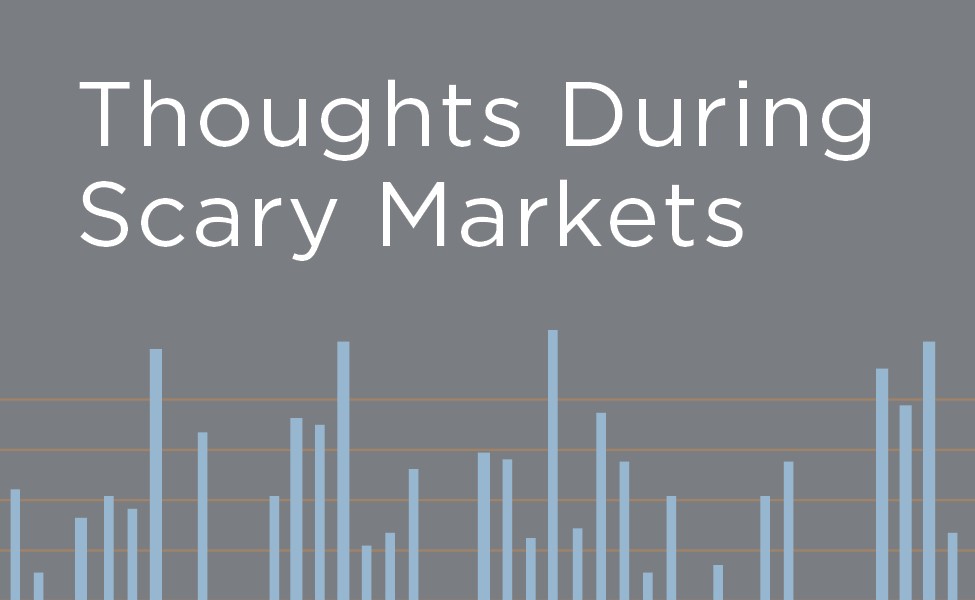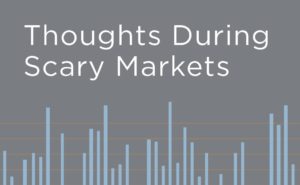
Are COVID-19 & the financial markets concerning you?
We’re Here for You

We get it. Depending on how much attention you’ve been paying to the news, you may be feeling anywhere from uncomfortable to mildly panicked. So, we’d like to share some thoughts on what is happening now, some ideas on how to think about it, and how to cope today and in the weeks ahead.
BUT if the breaking news is leaving you feeling strained to a breaking point, please be in touch with us immediately. Together, we’ll take an objective look at your thoughts, hopes, and fears. Together, we’ll continue to chart a sensible course forward.
HEALTH
First, and really what is most important, is your good health, and those of your loved ones and your community. Make sure you are reading and listening to only trusted sources.
Here is the government website about the coronavirus (COVID-19)
The three phases of Covid-19 – and how we can make it manageable
How is the coronavirus likely to play out, how does it end, and does our behaviour make a difference? Here infectious diseases expert Dr Siouxsie Wiles walks us through the epidemic curve, with illustrations by Toby Morris.
Social distancing, hand washing, etc. are about limiting the burden of COVID-19 on the healthcare system and helping the infirm and elderly avoid exposure.
Here’s what you need to know about coronavirus and your health insurance
MARKET COMMENTARY
Liz Ann Sonders, Senior Vice President, Chief Investment Strategist, Charles Schwab & Co., Inc., has a good explainer of what’s happening in the markets.
“…our advice to investors hasn’t changed. For the past couple of years—given our perspective that we were entering the latter stages of the cycle—we have been pounding the table on diversification (across and within asset classes) as well as periodic/systematic rebalancing. Those tried-and-true disciplines are the closest thing an investor can get to a “free lunch” in this crazy business.
Perhaps most important is that investors heed our age-old warnings: (1) Neither “get in” nor “get out” are investment strategies … they represent gambling on moments in time, when investing should ALWAYS be a process over time. (2) Panic is not an investment strategy.”
YOU, YOUR FINANCIAL PLAN, AND YOUR INVESTMENT PORTFOLIO
Your financial plan and investment portfolios are designed to weather these kinds of events. Together we have worked to ensure you have the “right” amount in checking and savings accounts to pay your bills, with an appropriate amount in cash and bonds (i.e. your target asset allocation) in the portfolios we manage for you. These “boring” bond funds have worked exactly as intended. They play defense for you. They also provide dry powder — when it is time to rebalance, we can sell bonds then buy stocks at reduced prices. If you unexpectedly need cash, we can sell from the bond side instead of locking in losses on the stock side of your portfolio. And we can tap the interest and dividend income generated from your investments.
The portfolio we manage for you is designed for the long haul — for your personal needs and your particular time horizon. Your goals are dramatically different than those of Wall Street traders and their machine-driven algorithms who are measured on daily results, and as investors, we need to act accordingly by not letting their actions dictate our response.
From Morgan Housel – The Reasonable Formation of Unreasonable Things
“The majority of your lifetime investment returns will be determined by decisions that take place during a small minority of the time. Most of those periods come when everything you thought you knew about investing is thrown out the window.
What you did from September 2008 to March 2009 likely had more impact on your lifetime investment returns than what happened cumulatively from 2002 to 2007, or from 2009 to 2017.
The pilot’s famous answer when asked about his job — “Hours of boredom punctuated by brief moments of terror” — applies perfectly to investing.
Few things matter more in investing than understanding your own time horizon and not being persuaded by the price actions caused by people with different time horizons. No matter what kind of investor you are, the key to success is not participating in a game other than the one you intended to play.”
THIS IS NOT 2008-2009
From the Wall Street Journal – How to Keep Calm as Coronavirus Fears Turn Into Market Panic
“World’s financial system is less fragile today than it was during the financial crisis, which should help limit the consequences of the extreme market moves under way.”
WHY DON’T WE….
From Joshua Brown – I’m here, to remind you
“Why don’t we just sell everything and wait this out? Get back in when the dust settles?”
This is the question every financial advisor is getting this week, from at least one or two clients. They’re asking out of genuine curiosity, not just panic or fear. And it’s a great question. The great answer is that you won’t know when the dust settles. There’s no airplane writing the “all clear” in the sky above your neighborhood. And when the dust settles, do you think stocks will be at their lows? Or will they have already rallied furiously, in anticipation of this?
Let me give you an example. Today is March 9th. Precisely eleven years ago today, in 2009, the stock market stopped going down. There was no reason. The dust had settled, without fanfare or any sort of official announcement. If you had polled people that day, or week or even month, most would not have agreed that we had seen the worst. The economic headlines were not improving. But there it was. And by June 1st, less than 3 months later, the stock market had climbed 41% from that March low. And even with that having happened, the majority of participants still weren’t clear that the dust had fully settled. That we had, in fact, seen the worst. There were still people calling us 3, 5 and 7 years later that had gone to cash and still hadn’t gotten back into stocks. They missed a new record-high a few years later, hundreds of percentage points in compounding on their assets.
All-in or all-out are terrible strategies.
You cannot afford to miss the 25 best days in the market, or your returns are wiped out and you may as well have simply sat in 5-year Treasuries. The catch is that the 25 best days are frequently clustered among the 25 worst days. You can’t have the up without the down. Anyone promising you otherwise is either uninformed or a liar. I have often observed that it’s usually some combination of the two. In October of 2011, we were in the midst of the European Debt Crisis and stocks were rising and falling by 2 and 3% every day. Volatility was off the charts. I wrote about the stupidity of being all-in or all-out nine years ago, in the middle of that storm, and every word of it still rings true right now.
Most importantly, remember your ABC’s: Always Be Cool.
You only have control of one thing – your own actions. The other stuff will work itself out, regardless of what you think or say or do. So be cool. Be armed with context, wisdom, patience, humility and a sense of humor. See you on the other side.”
Come what may in the days to come, SAGEbroadview is here for you.
 Secure Document Sharing
Secure Document Sharing


